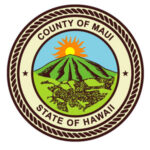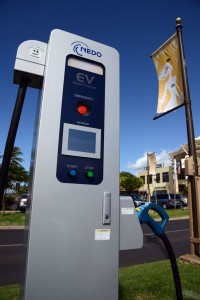
Oct 15, 2014 | Community, Environment, Sustainability
 Maui County students in kindergarten through 12th grade are invited to submit art designs to beautify the island’s JUMPSmartMaui Fast-Charger stations. “This is a chance for Maui’s talented students to shine and jump-start their creative juices by coming up with some original designs for our island’s JUMPSmart electric vehicle charging stations,” said Jeanne Skog, President and Chief Executive Officer of Maui Economic Development Board.
Maui County students in kindergarten through 12th grade are invited to submit art designs to beautify the island’s JUMPSmartMaui Fast-Charger stations. “This is a chance for Maui’s talented students to shine and jump-start their creative juices by coming up with some original designs for our island’s JUMPSmart electric vehicle charging stations,” said Jeanne Skog, President and Chief Executive Officer of Maui Economic Development Board.
MEDB and Hitachi are sponsoring the student art contest. Judges will look for entries with an original design that positively represents Maui’s community, the environment and clean energy. The EV chargers are an important component of the JUMPSmartMaui demonstration project, which seeks to incorporate renewable energy, smart grid technologies and electric vehicle solutions to achieve a clean future for Maui County. NEDO, Japan’s largest public research and development management organization, is investing $30 million in the project.
The winner’s artwork will be displayed on existing and upcoming JUMPSmartMaui fast charger stations on Maui Island. An example of winning artwork already installed can be found at the Queen Kaahumanu Center station. Currently, stations are located at the Kaanapali Beach Hotel, Maui Tropical Plantation, Maalaea Triangle (Maui Ocean Center) and Piilani Village Shopping Center. New locations will be at the Pukalani Shopping Center and Long’s in Kulamalu Pukalani. More than a dozen other stations are being planned. Artwork can be created in digital media or using crayon, color pencil and/or paints. Only 2-dimensional art will be accepted. For art contest rules and guidelines, go to www.medb.org Deadline for submissions is 4:30 p.m., Friday, Oct. 31. Application forms are available at the JUMPSmartMaui Innovation Center at the Queen Kaahumanu Center or MEDB at 1305 North Holopono Street, Suite 1, in the Maui Research & Technology Park in Kihei. For more information, contact Lalaine Pasion at MEDB: lalaine@medb.org, (808) 875-2341.
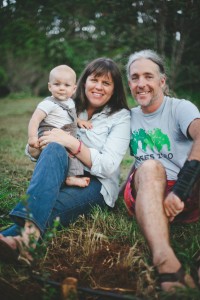
Sep 10, 2014 | Community, Sustainability

After planting trees in every state across the country, Joe Imhoff and Sara Tekula returned to their roots on Maui, giving life to a newborn son, and their fledgling nonprofit, Plant a Wish. The husband-and-wife team was first featured in Focus Maui Nui three years ago in the midst of a tree-planting mission. They identified tree caretakers in each of the states and helped to spearhead the planting of more than 1,000 native trees at dozens of community tree planting events.
Their plan to create a documentary about the tree-planting venture is still in post-production, in part because they had to turn their attention to the birth of a son, Henry Koa, in October 2012. In his first year of life, Henry accompanied his dad, Joe, in planting a tree on every day in 2013, mostly on Maui but in other places as well. “Even when we were on vacation and then attending a family wedding on the Mainland, Joe made certain they planted a tree somewhere every day,” Tekula said.
Today, Plant a Wish is taking root on Maui where Tekula and Imhoff have partnered in a variety of events and with other nonprofits to bring awareness to land stewardship, tree planting and restoration of native habitat. Plant a Wish is also teamed up with Tri-Isle Resource Conservation and Development, which serves as its fiscal sponsor. Tekula said much of her time is spent in tree dedications, an opportunity that residents take to plant trees in celebration of special events and/or people in their lives. Plant a Wish is also busy during the holiday season when Tekula and Imhoff sell native Christmas trees as a fundraiser and a chance to educate more people about tree planting. “We’re really glad we’re here on Maui and that our mission of tree restoration can keep going.” For more information, go to: plantawish.org
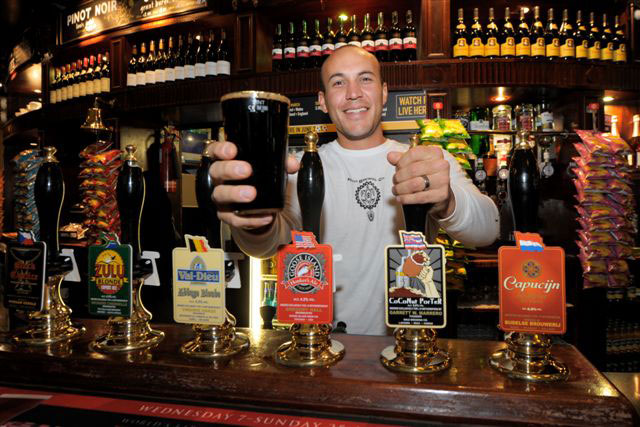
Jun 25, 2014 | Community, Environment, Sustainability

A new brewery is nearing completion in Kihei. Owned and operated by husband and wife, Garrett and Melanie Marrero, Maui Brewing Co.’s newest venture represents a response to their business’ growing demand. The Marreros founded their company almost 10 years ago and today operate a seven-barrel brewpub in Kahana and a 25-barrel production brewery and canning facility in Lahaina. Come this fall, Maui Brewing Co. will close its Lahaina brewery and open a new 42,000-square-foot facility in Kihei on 5.3 acres in the Maui Research & Technology Park, right next to Maui Economic Development Board’s offices.
“Our business is very multi-faceted,” Garrett Marrero said. “What we have shown and demonstrated is that you can be a successful manufacturing business in Hawaii,” Marrero said. The company’s BrewPub in Lahaina will remain open and together with the new brewery in Kihei, Maui Brewing Co.’s staff will grow from 59 employees today to approximately 140 when the brewery and a new Kihei brewpub opens. “When you manufacture a product truly local, our entire community succeeds,” he said. Aside from the brewery, the Kihei location will also house a distillery, a tasting room and eventually a BrewPub. “People want to support local. They want to support something that’s authentic to the islands,” Morrero said as he explained Maui Brewing Co.’s success. Maui Brewing Co. beers are sold in 11 states and four countries.
Maui Brewing Co. describes itself as a “truly Hawaiian brewery.” The company has been recognized as Hawaii’s No. 1 craft beer producer since 2005. Beers are packaged in eco-friendly materials with cans manufactured on Oahu and designed by local Maui artists. The cans, according to Maui Brewing Co., have the added bonus of better protecting the beer from both light and oxygen damage which can compromise the taste. A unique, recyclable plastic carrying device is used to hold the cans. The spent grain from beer production is donated to local ranchers for cattle feed and composting.
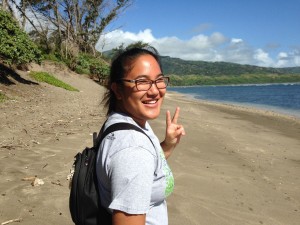
Jun 18, 2014 | Environment, Sustainability
 Baldwin High School student Chelsea Kau got up close and personal with marine life on a recent Maui Youth Alliance excursion to visit the Waihee Beach Park with Department of Land and Natural Resources staff and learn about ocean safety. The best part of the visit “was when I got to cut a hole in a fish to feel for the cavity in its belly, and then suture the fish,” the 15-year-old Wailuku resident said.
Baldwin High School student Chelsea Kau got up close and personal with marine life on a recent Maui Youth Alliance excursion to visit the Waihee Beach Park with Department of Land and Natural Resources staff and learn about ocean safety. The best part of the visit “was when I got to cut a hole in a fish to feel for the cavity in its belly, and then suture the fish,” the 15-year-old Wailuku resident said.
Kau said she gained an appreciation of the impact humans are having on the ocean and its sea life. Overfishing may be one of the biggest problems contributing to fewer fish in the ocean, she said. “But, it’s also because of these other land factors such as sewage pumps and humans stepping on the coral reefs, etcetera. But the only thing that can be controlled right now, is the overfishing.” Kau, who has participated in the Youth Alliance for two years, advocated for diving and fishing for subsistence only. “That’s the way it should be, because you don’t need 10 or 15 fish for a family of three or four,” she said. “Take what you need.” After visiting marine resource officials, Kau said she believes shark attacks are “more than likely” caused by debris that has floated to the Hawaiian Islands from the earthquake and tsunami that devastated Japan on March 11, 2011.
Kau said she believes ocean safety is a challenge: “It’s ‘something you can’t control’ as ‘Mother Nature is unpredictable.’ But because we have lifeguards and all of the land emergency services, they’re saving the lives of people who don’t know our currents and tides,” she said. Youth Alliance members attend monthly events during the school year to explore and gain a greater understanding of key components in the Maui community. The Maui Economic Development Board coordinates the group’s gatherings.
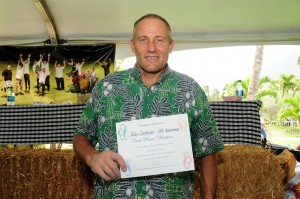
Apr 16, 2014 | Community, Sustainability

Haiku resident John Cadman’s career as a hotel sous chef, a school cafeteria manager and now the owner of a locally sourced food business has always focused on healthy alternatives. “I just felt like it was my destiny,” Cadman said, referring to his newest venture as the owner and sole operator of the Maui Breadfruit Company and Pono Pies. Cadman earned first place at the 2014 Hawaii Food Products Recipe Contest for his Maui ‘Ulu Hummus during the Maui County Ag Festival.
After working for 18 years in cafeterias at Haiku Elementary, King Kekaulike High School and Kamehameha Schools Maui, Cadman found himself studying, cooking and eventually promoting the use of breadfruit in daily living. “There was like this huge hole, vacuum, with breadfruit. I was so inspired, I decided to go with it,” he said. He launched Pono Pies, gluten-free, dairy-free desserts served up at local restaurants and sold at retail outlets. The pies made their debut at Whole Foods Market in Kahului just this month. The Maui ‘Ulu Hummus features breadfruit, macadamia nuts and lemon juice as its primary ingredients. Cadman says 90 percent of the hummus comes from local island sources. “Localized food sources make a lot of sense, and it allows us to be healthy,” he said.
“I think people are eating with a conscience,” Cadman said, noting a national shift away from processed foods and items with high sugar and high fat content. “We’re all more conscious now of the leading causes of obesity, diabetes and cancer and most of them are causes by lifestyle choices, especially diet,” he said. As the winner of the Hawaii Food Products Recipe Contest, Cadman will receive assistance from Maui Food Technology Center consultants with nutritional labels or food science services. “I’ll take all the help I can get,” Cadman said.
The Maui Food Technology Center is an organization dedicated to growing Hawaii’s food industry and connecting students, food producers and farmers through the practice of food science. The Maui Economic Development Board is a founding member of the Maui Food Technology Center, and MEDB President and CEO Jeanne Skog serves on its board of directors.
“Eating consciously entails eating food that’s healthier for the body, the environment and for the planet.” — John Cadman, Owner and operator of the Maui Breadfruit Company, Winner of the 2014 Hawaii Food Products Recipe Contest

Feb 19, 2014 | Small Business, Sustainability
 On Wednesday, February 26, 2014, Maui Food Technology Center will hold their 1st Annual Supply and Service Expo at the Hannibal Tavares Community Center in Pukalani from 10 am to 3 pm.
On Wednesday, February 26, 2014, Maui Food Technology Center will hold their 1st Annual Supply and Service Expo at the Hannibal Tavares Community Center in Pukalani from 10 am to 3 pm.
This is the perfect opportunity for new or existing food producers wanting assistance with the many challenges of developing a product and getting it into the marketplace, entrepreneurs planning to expand their network opportunities and resources, and consumers interested in attending the tradeshow and hearing the latest from experts in the food manufacturing, distribution and hospitality industries.
A tradeshow comprised of national, state and local service providers will feature manufacturers and distributors of food, ingredients, equipment and packaging supplies; dealers, brokers and traders; business services and educational groups that work with the food and hospitality industries. Entrepreneurs and existing businesses will also have an opportunity to network with brand identity and marketing industry professionals.
Specialized presentations will be held throughout the event. Featured speakers include
- Dr. Aurora Saulo, Professor and Extension Specialist in Food Technology with the University of Hawaii Maui College on “Food Safety Certified: What Does That Mean?”
- Marc McDowell, Executive Chef of Makena Resort on “Developing Local Products From Start To Finish”
- Marty Parisien, Co-Owner/CEO at Singing Dog Vanilla on “Social Media Zen”
- Mike Abrams, President of Flavor Waves, on “Get Out There, Make Friends, and Help People.”
Door prizes will be drawn throughout the event, must be present to win. Attendees are also eligible to win a 32 GB i-Pad Mini, need not be present to win. The first 100 people will receive a free Expo tote. Public admission is free.
Major event sponsors include: County of Maui Office of Economic Development, Fred Baldwin Memorial Fund, and Tri-Isle Resource Conservation and Development.
For more information on becoming an exhibitor and/or attending the Supply and Service Expo, visit MauiFoodTechnology.org or call 888-948-6382.
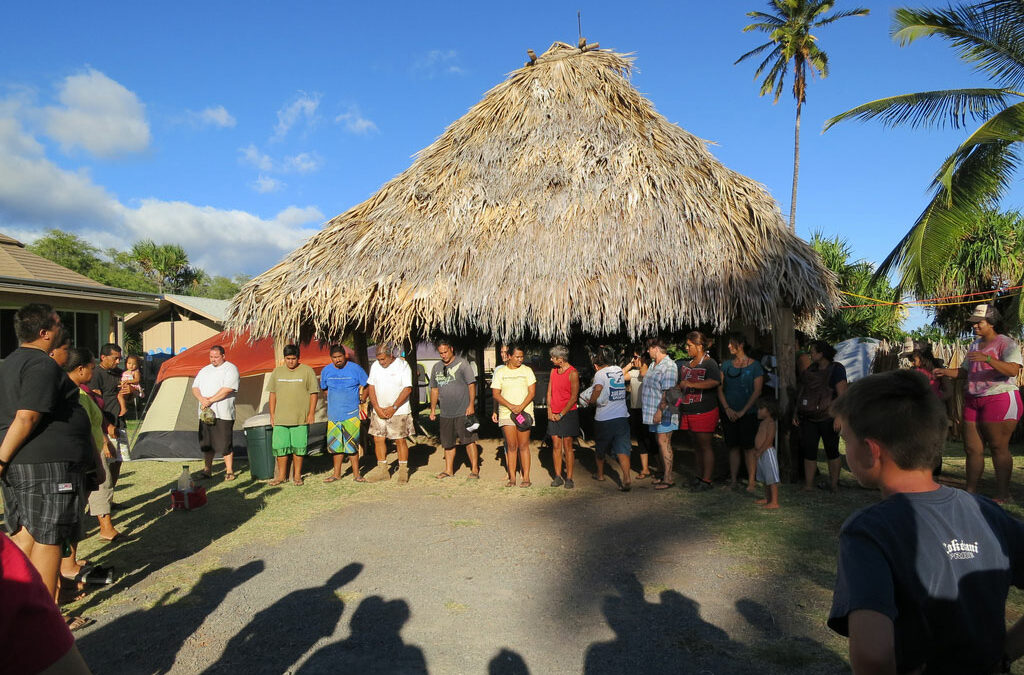
Dec 18, 2013 | Education, Environment, Sustainability
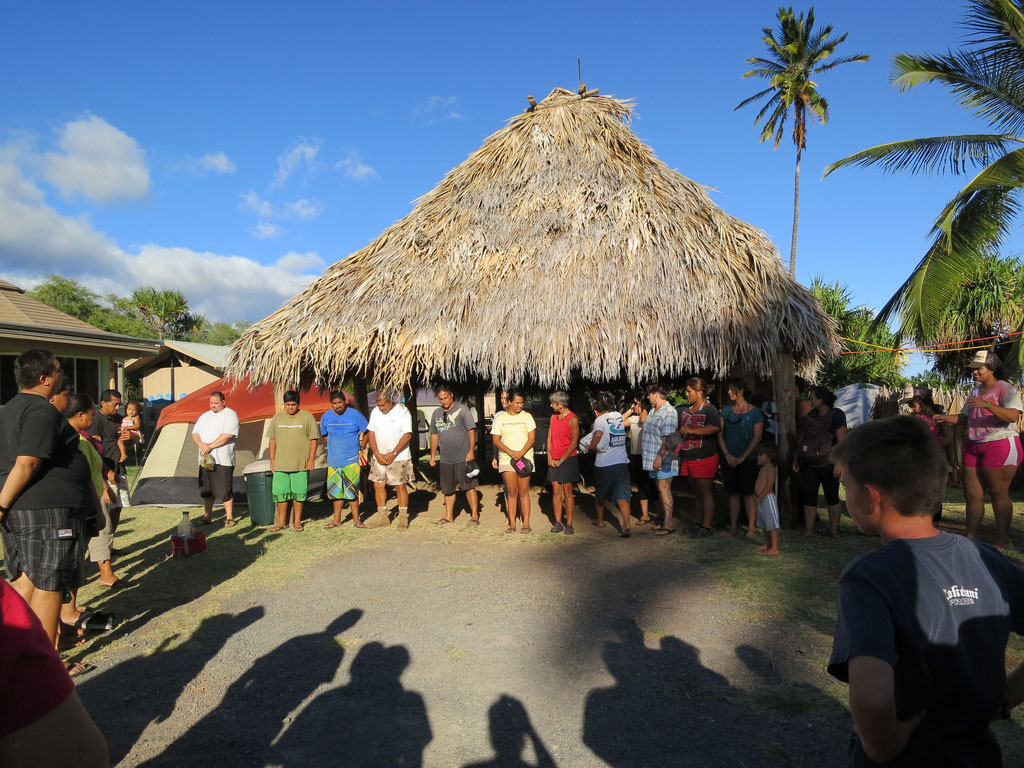 Ka Honua Momona means “abundant Earth,” and a Molokai nonprofit of that name is reawakening the fertile Friendly Isle through the restoration of ancient Hawaiian fishponds on the island’s south shore. “Molokai was once known as the breadbasket of the islands due to the momona (abundance) of the land and sea,” said Kauwila Hanchett, the nonprofit’s executive director. “We believe Molokai can return to momona and become a model of sustainability for others.”
Ka Honua Momona means “abundant Earth,” and a Molokai nonprofit of that name is reawakening the fertile Friendly Isle through the restoration of ancient Hawaiian fishponds on the island’s south shore. “Molokai was once known as the breadbasket of the islands due to the momona (abundance) of the land and sea,” said Kauwila Hanchett, the nonprofit’s executive director. “We believe Molokai can return to momona and become a model of sustainability for others.”
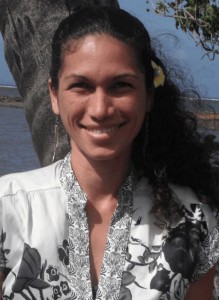
In fact, “sustainability is at the heart of all we do,” Hanchett said. “We are driven by our passion to ensure that the natural and cultural beauty of Molokai remains vibrant and strong for future generations.” Rooted in sustainability, the group is also actively engaged with nurturing young people, she said. “Training young people to become leaders through year-round and summer internships, as well as working with youth of all ages through our environmental education programs is an important part of our strategy to ensure that the resources we care for today continue to be protected in perpetuity,” Hanchett explained.
The nonprofit has 14 staff members and volunteers forming its “core team,” Hanchett said. Local school and community groups also donate more than 10,000 hours of service annually to fishpond restoration. “Together, we are removing invasive species, rebuilding the ancient rock walls surrounding the pond, and restoring the momona of Alii and Kalokoeli fishponds,” she said. The group carries out its work with five core principles: hoewe, or cultural rootedness; kahu hoilina, environmental stewardship; kuka’I ka ha, deep sharing; ka ‘imi ‘ike, lifelong learning; and mahuaola, health and well-being, Hanchett said.
Ka Honua Momona hosts Community Work Days on the third Saturday of each month. For more information, call (808) 553-8353 or visit the nonprofit’s website at www.kahonuamomona.org.
Sidebar quote
“Sustainability is at the heart of all we do.”
Kauwila Hanchett, Ka Honua Momona Executive Director
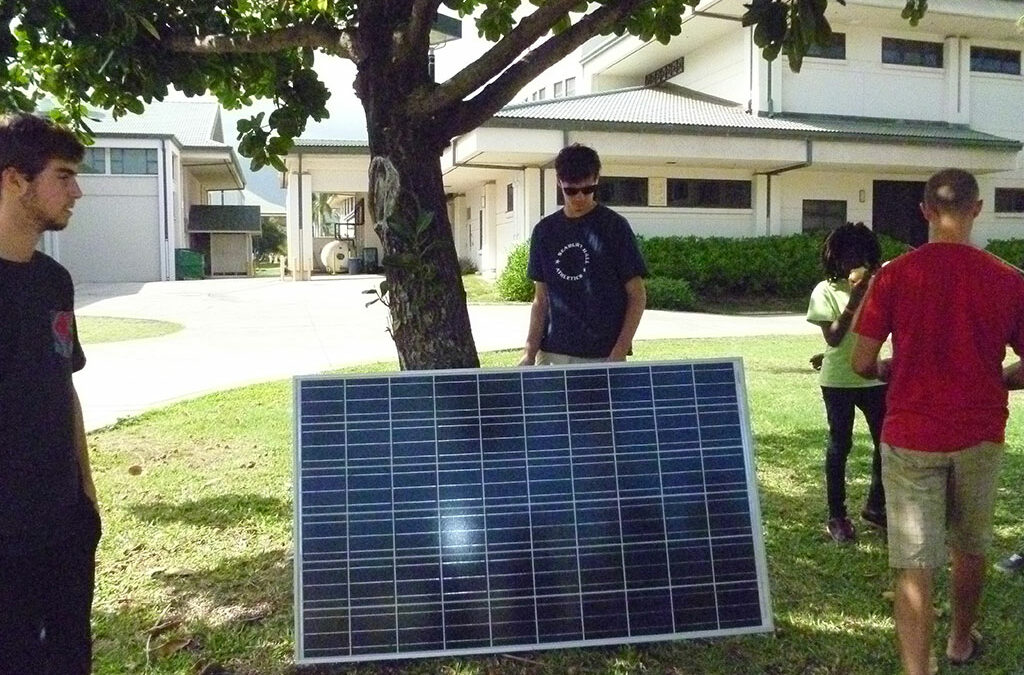
Nov 27, 2013 | Environment, Sustainability
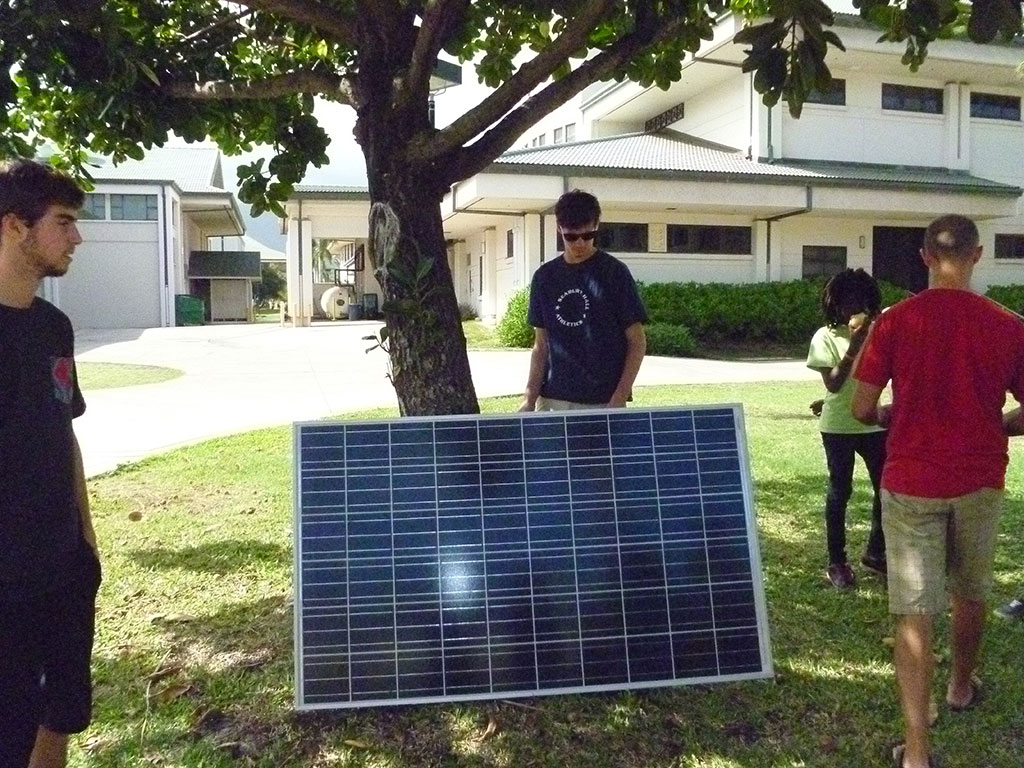 With the goal of exploring Maui’s infrastructure needs, the Youth Alliance launched this school year by focusing their time and talk on energy and electricity. “I would like to spark creativity in the students to come up with innovative solutions to current and future infrastructure challenges,” said Willow Krause, Maui Economic Development Board’s Youth Alliance Coordinator. High schoolers in the Youth Alliance took tours through Maui Electric Co., the University of Hawaii Maui College campus and were oriented to how solar panels work.
With the goal of exploring Maui’s infrastructure needs, the Youth Alliance launched this school year by focusing their time and talk on energy and electricity. “I would like to spark creativity in the students to come up with innovative solutions to current and future infrastructure challenges,” said Willow Krause, Maui Economic Development Board’s Youth Alliance Coordinator. High schoolers in the Youth Alliance took tours through Maui Electric Co., the University of Hawaii Maui College campus and were oriented to how solar panels work.
Presentations and discussions covered general sustainability issues from energy efficiency to recycling to carbon footprints. Youth Alliance members Chelsea Kau and Kaitlyn Yamada were intrigued by what they learned about a carbon footprint – the amount of greenhouse emissions a person’s lifestyle choices produce and contribute to overall climate change. It is usually expressed in equivalent tons of carbon dioxide. “I learned a lot about people’s carbon footprint and how a lot of what you do adds to your carbon footprint,” Yamada said. “This has taught me to be very mindful of what I do, like driving around and even simply just drinking from a water bottle,” she added. Kau said she’s become more aware of the effects of energy consumption. “I definitely believe that the world needs to be more intuitive about the energy decisions we make as a whole. We are slowing running out of fossil fuel, which has been running the world for ages,” she said.
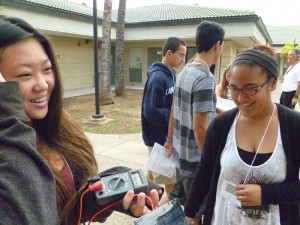 Youth Alliance members attend monthly events during the school year to explore and gain a greater understanding of key components in the Maui community. Their gatherings are coordinated by the MEDB, and often include a community service project. “I think that on Maui we are all very aware of the energy issues and are doing our best to adapt to a new way that is more sustainable for us,” Yamada said.
Youth Alliance members attend monthly events during the school year to explore and gain a greater understanding of key components in the Maui community. Their gatherings are coordinated by the MEDB, and often include a community service project. “I think that on Maui we are all very aware of the energy issues and are doing our best to adapt to a new way that is more sustainable for us,” Yamada said.
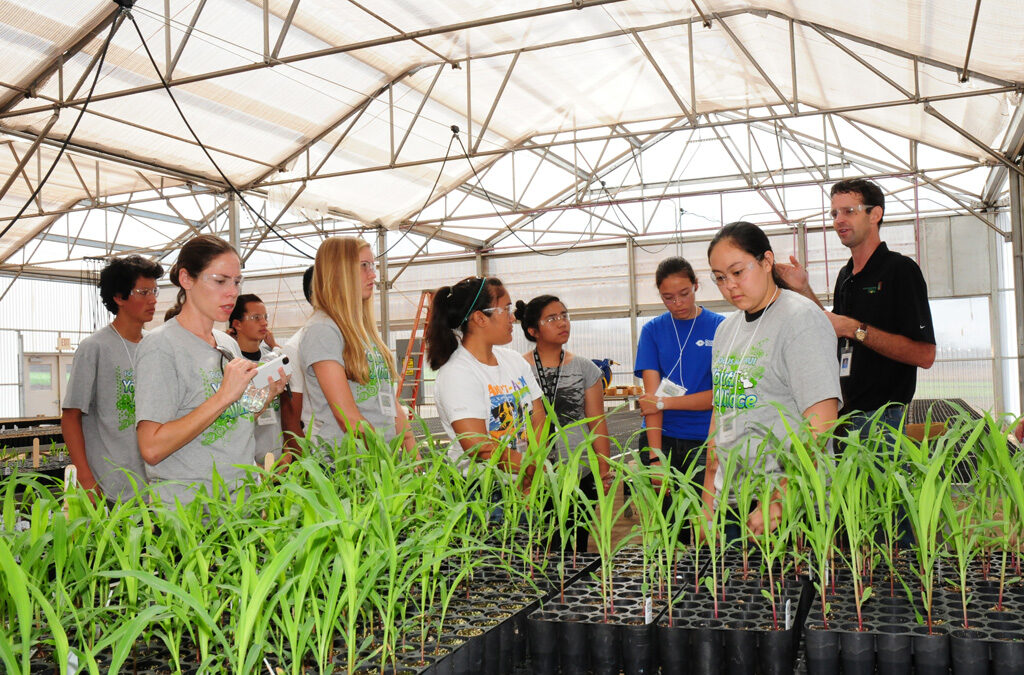
Nov 14, 2012 | Environment, Sustainability
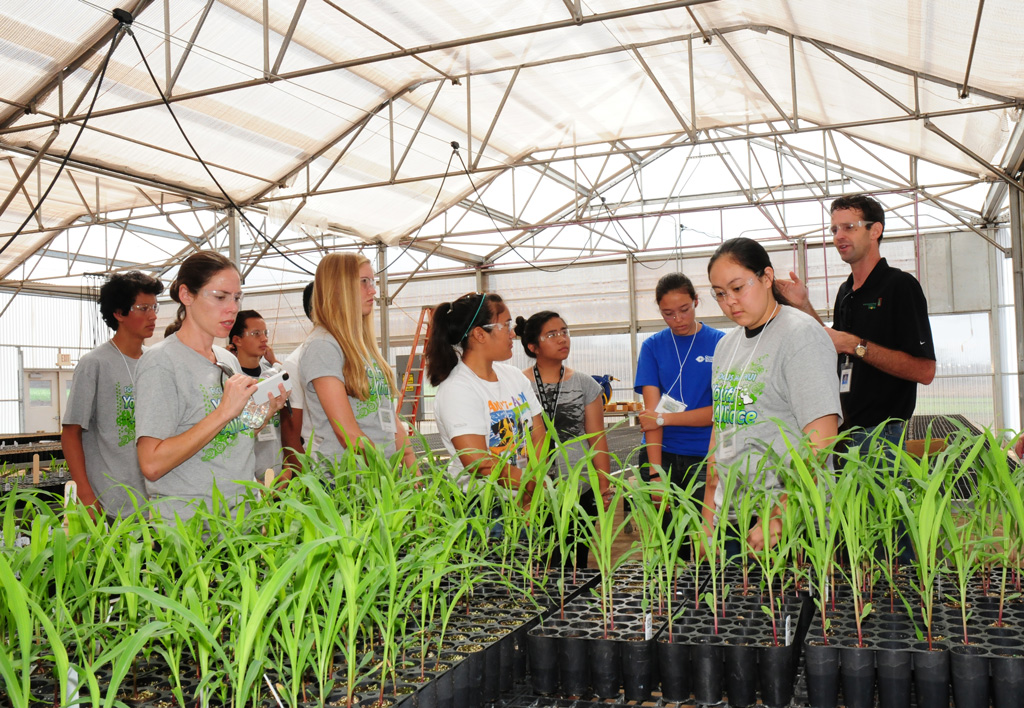 Members of the Focus Maui Nui Youth Alliance visited Monsanto Co.’s Maui operations recently, getting a close-up look at the company’s high-tech operations to grow seed corn to make a dent in world hunger. Both Racieli Andrada, 16, a junior at Maui High School, and Kaile Stockham, 15, a sophomore at Lahainaluna High School, had heard the negative publicity about Monsanto, such as its work with genetically engineered food. While Andrada came away from the experience impressed, Stockham remained skeptical, but said she was open-minded.
Members of the Focus Maui Nui Youth Alliance visited Monsanto Co.’s Maui operations recently, getting a close-up look at the company’s high-tech operations to grow seed corn to make a dent in world hunger. Both Racieli Andrada, 16, a junior at Maui High School, and Kaile Stockham, 15, a sophomore at Lahainaluna High School, had heard the negative publicity about Monsanto, such as its work with genetically engineered food. While Andrada came away from the experience impressed, Stockham remained skeptical, but said she was open-minded.
“I learned that Monsanto uses a lot of advanced technology to help keep track of the seeds and to help them grow to their full potential,” Andrada said. She said Monsanto changes the genes within corn seeds “to allow the crop to grow to its full potential without being harmed or disturbed by the environment,” such as pests. Stockham said she “really enjoyed going in the greenhouse, where we got to watch things in action.” “I was baffled by the fact that they are able to electronically track every seed that ever enters their state-of-the-art facilities,” she said. Stockham also said she was intrigued to learn that Monsanto’s technicians shave off a piece of each seed to send to a lab on the Mainland “where they run it through a DNA machine that determines whether or not the seed has the qualities they are looking for.”
Youth Alliance members attend monthly events during the school year to explore and gain a greater understanding of key components in the Maui community. Their gatherings are coordinated by the Maui Economic Development Board, which is celebrating its 30th anniversary in 2012. Stockham said she believes that all citizens have a “duty to be well-informed” on all current topics and the tour at Monsanto was an experience toward fulfilling her duty. “I believe the only way for us to make the best decisions for Maui’s future is if everyone on Maui is actively informed and participating in local decisions.”

 Maui County students in kindergarten through 12th grade are invited to submit art designs to beautify the island’s JUMPSmartMaui Fast-Charger stations. “This is a chance for Maui’s talented students to shine and jump-start their creative juices by coming up with some original designs for our island’s JUMPSmart electric vehicle charging stations,” said Jeanne Skog, President and Chief Executive Officer of Maui Economic Development Board.
Maui County students in kindergarten through 12th grade are invited to submit art designs to beautify the island’s JUMPSmartMaui Fast-Charger stations. “This is a chance for Maui’s talented students to shine and jump-start their creative juices by coming up with some original designs for our island’s JUMPSmart electric vehicle charging stations,” said Jeanne Skog, President and Chief Executive Officer of Maui Economic Development Board.






 Ka Honua Momona means “abundant Earth,” and a Molokai nonprofit of that name is reawakening the fertile Friendly Isle through the restoration of ancient Hawaiian fishponds on the island’s south shore. “Molokai was once known as the breadbasket of the islands due to the momona (abundance) of the land and sea,” said Kauwila Hanchett, the nonprofit’s executive director. “We believe Molokai can return to momona and become a model of sustainability for others.”
Ka Honua Momona means “abundant Earth,” and a Molokai nonprofit of that name is reawakening the fertile Friendly Isle through the restoration of ancient Hawaiian fishponds on the island’s south shore. “Molokai was once known as the breadbasket of the islands due to the momona (abundance) of the land and sea,” said Kauwila Hanchett, the nonprofit’s executive director. “We believe Molokai can return to momona and become a model of sustainability for others.”

 With the goal of exploring Maui’s infrastructure needs, the Youth Alliance launched this school year by focusing their time and talk on energy and electricity. “I would like to spark creativity in the students to come up with innovative solutions to current and future infrastructure challenges,” said Willow Krause, Maui Economic Development Board’s Youth Alliance Coordinator. High schoolers in the Youth Alliance took tours through Maui Electric Co., the University of Hawaii Maui College campus and were oriented to how solar panels work.
With the goal of exploring Maui’s infrastructure needs, the Youth Alliance launched this school year by focusing their time and talk on energy and electricity. “I would like to spark creativity in the students to come up with innovative solutions to current and future infrastructure challenges,” said Willow Krause, Maui Economic Development Board’s Youth Alliance Coordinator. High schoolers in the Youth Alliance took tours through Maui Electric Co., the University of Hawaii Maui College campus and were oriented to how solar panels work. Youth Alliance
Youth Alliance
 Members of the
Members of the 